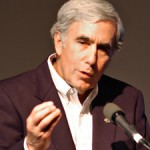More and more nukes: Why Waltz is wrong
By David Krieger
The lead article in the July/August 2012 issue of Foreign Affairs is titled “Why Iran Should Get the Bomb.” The author, Kenneth Waltz, a former president of the American Political Science Association, argues that the world should stop worrying about Iran getting the bomb. He sums up his basic argument this way: “If Iran goes nuclear, Israel and Iran will deter each other, as nuclear powers always have. There has never been a full-scale war between two nuclear-armed states. Once Iran crosses the nuclear threshold, deterrence will apply, even if the Iranian arsenal is relatively small.”
In essence, Waltz puts his faith in nuclear deterrence and justifies this in historical terms. But the history is short and there have been many close calls. During the 67-year period since the dawn of the Nuclear Age there have been numerous accidents, miscalculations and threats to use nuclear weapons. Fifty years ago, the US and Soviet Union stood at the precipice of nuclear war during the Cuban Missile Crisis. Waltz’s faith in nuclear deterrence reflects a belief in rationality, a belief that all leaders will behave rationally at all times, including under conditions of extreme stress. This defies our understanding of human behavior and the ever-present potential for human fallibility.
Another way to view the historical data from which Waltz finds comfort is by an analogy of a man jumping off a hundred-story building. As he passes floor after floor, he wonders why people on the ground are showing concern for his well-being. He ignores the approaching ground and focuses his attention on the fact that nothing bad has happened to him yet. In Waltz’s theory of nuclear deterrence, there is no hard ground below, nor gravity acting upon the jumper. He argues that “history has shown that where nuclear capabilities emerge, so, too, does stability. When it comes to nuclear weapons, now as ever, more may be better.” While having more may be better, it may also be far worse.
Martin Hellman, a professor emeritus of electrical engineering at Stanford University and an expert in risk analysis, argues that a child born today has a ten percent or greater chance of having his or her life cut short by nuclear war. Unlike Waltz’s analysis, risk analysis takes into account the odds of an event occurring and doesn’t base its analysis of the future simply on what the historical record shows at a given point in time. Ten coin flips may produce ten straight “heads,” but it would be unwise to assume that the results between heads and tails would not even out over time. With nuclear weapons, the consequences of being wrong in one’s projections are, of course, far more dire than with coin tosses.
Another analogy that has been used to describe the standoff between nuclear-armed powers, particularly the US and Soviet Union during the Cold War, was of two men standing up to their waists in the same pool of gasoline and each man being ready to strike an unlit match. If either man struck the match, both men would be consumed by the fire that would result. With nuclear weapons, the conflagration would not stop at the two men – it would include their families, their communities, their countries and the world.
Waltz makes the bet that no leader of a nuclear weapon state will ever strike the match or allow the match to fall into hands that will strike it. It is a foolish bet to make. The two men, and the rest of us, would be far safer if the gasoline were drained from the pool. In the same way, the world would be much safer if nuclear weapons were abolished, rather than shared in the hope they would enhance security in the Middle East or elsewhere.
Waltz may believe that it is precisely the threat of conflagration that keeps the men from striking the matches. For many, even most, men he may be correct, but the fact is that neither Waltz nor anyone else can predict human behavior under all conditions. There may be some leaders in some circumstances for whom striking the match would seem rational. In addition, even if neither man were to strike a match, lightning may strike the pool of gasoline or other sparks may ignite the pool from unforeseen causes. Instances of accidents, madness and human fallibility abound.
Nuclear weapons have brought humankind to the precipice. These weapons threaten cities, countries, civilization and complex life on the planet. It is the responsibility of those of us alive on the planet now to abolish these weapons of mass annihilation, not justify their spread, as Waltz would have us do.
